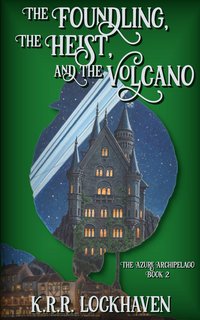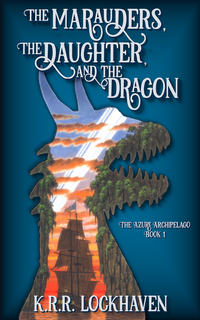I didn’t think I had much to say about this book until I was about halfway finished with the post and realized I was nowhere near done with it. I’m not certain it’s all that coherent now, but it’s done, or as close to done as I can get without another two-three days to tweak it and wring all the stream-of-consciousness out of it.
 The Foundling, the Heist, and the Volcano
The Foundling, the Heist, and the Volcano
DETAILS: Series: The Azure Archipelago, #2 Publisher: Shadow Spark Publishing Publication Date: January 20, 2023 Format: e-Book Length: 313 pg. Read Date: February 13-15, 2023

What’s The Foundling, the Heist, and the Volcano About?
It’s been a year or so since the events of MD&D* when we rejoin our friends on Adventure Ship as they pay a quick visit to Azure’s father.
*I’m just not going to refer to these books with their logorrheic titles, I’m just using initials. And to be snotty, I’m taking out all the T’s.
The visit is cut short when Azure receives a job offer—getting the Marauders a reliable flow of income is Azure’s top priority and it’s not going well. A raven named Sir Terry brings this lucrative offer to her and they have to jump on it—the fact he gets such an auspicious name, tells you how much we’re going to see Sir Terry for the next couple of books, I think. The Mauraders are on a hunt for buried treasure on behalf of the man who buried it and cannot seem to find it. For those thinking about the title, the treasure is buried near a volcano.
Along the way to the treasure, they get attacked by a pirate which proves to be a test of the new captain, who acquits herself well. They then discover that the treasure has been discovered by someone else very recently—requiring the titular heist. They also find the foundling—a young girl who stumbled into this world from Earth (getting her home also requires the titular heist). The girl isn’t the only one who came to this world from Earth—later on, a gargoyle on the hunt for a certain dragon does, too.
That’s a lot for a novel to tackle in 313 pages—but Azure and the Mauraders are up to it. Probably.
Before I Dive Into the Book
Pre-Chapter One, Lockhaven gives us a recap of the first novel. This is to be commended, and I try to make a point of saying it when any author does this because it needs to become a standard.
He gets bonus points for having a character do it in a very organic way, helping the reader get back into the feel of things in addition to remembering the events.
The Foundling
Oh, boy. I don’t know if I can remember a more adorable kid in fiction than Oriana.* It took me a freakishly small amount of time to fall under her charms—she’s brave, she’s sweet, she’s adaptable, she’s resilient, and she’s incredibly vulnerable.
* Oh, okay. Maggie Dresden. But it’s close.
The reactions of the crew—especially Elijah and Azure—to her are believable and do a great job of enforcing what the reader is already thinking about her.
What strikes me about Oriana is that really, Lockhaven doesn’t spend that much time on her—it’s actually largely the reactions of others to her that endear her to the reader. All the Maurauders take her in, Elijah dotes on her, but it’s Azure thinking about her, attempting the heist to get her home, and (being incredibly vague) going through a lot of introspection because of her. It’s through that that the reader really makes the connection to Oriana—as Azure and the others grow in their affection for her, so does the reader.
The Heist
It seems that people associated with a casino on Mirth Island took both the treasure and a tool that would return Oriana to her home (not recognizing it for what it is). Azure foolishly/full of belief in the goodness of people asks the Casino owner for them back. He takes a quick break from twirling his mustache to refuse her, so she has to come up with a new solution. One more suited for the Marauders.
I’m not sure why either Lockhaven or Azure bothered with that—although it does give us a chance to meet the owner, Mr. Pierce, and look around a bit at the Casino. Pierce—and the people (and the falcon) who work for him are pretty despicable—they have ties to Gov. Pratt, and display the species-ism and sexism we’d associate with the former governor, with a heaping side-order of avarice. Not that the reader wouldn’t have been cheering for the Marauders to succeed in their extra-legal efforts to get the property back, but Lockhaven makes sure that we have no sympathy for him.
The design of the heist itself is pretty clever—and Azure has definitely watched or read her fair share of stage plays and novels about them (or listened to epic songs about them?)—and draws on those to design her plan. Sure, it resembles a Rube Goldberg device, but if it works, it’ll be a thing of beauty. Like a good Rube Goldberg device. If it doesn’t…
The Volcano
Well, yeah, there’s a volcano. There’s not much more to say. It’s been dormant for a while now, but it’s waking up at the point we encounter it—and it gets closer and closer to being very not-dormant as the story progresses.
It honestly doesn’t play as much of a role in the novel as I expected, but it does play an important role—and it does loom over most of the novel.
The Ending
So MD&D wrapped up nicely—it really could’ve been a stand-alone and that would’ve been fine. Readers would definitely want more with these characters, but that’s just because we’re greedy when it comes to things that make us feel good and characters we like. There was nothing in it that demanded a sequel.
That is not at all the case with FH&V. Yes, there’s the greedy reader, feel-good stories, likable characters, etc. But that’s not what I’m talking about. There are at least three things that we need another book to address. There’s one thing that will likely consume most of the action/plot of the next book, there’s something that we need to know more about and that will likely be a running subplot to the main action—and then there’s something we need to see a resolution about in the first twenty pages or so. Two cliffhangers and one thing that we’re staring down at the cliff’s edge from a safe vantage point. And we’re hanging onto a strong, but not that strong, plant with one of those cliffhangers.
So, what did I think about The Foundling, the Heist, and the Volcano?
By skipping ahead a year, we miss out on the early, swoony days of romance between Elijah and Azure—we’re at the committed stage, and they’re trying to figure out how to navigate their relationship. I adore this—sure, those early, swoony days can be fun—but a couple doing the work (our focus is on Azure’s internal work, but we get glimpses of Elijah doing the same) within the commitment to make things go well? That’s what I want to see. Not a relationship falling apart, in danger of it, or blossoming—I see enough of those (and I’m not saying I want those stories to go away)—but it’s people navigating life together that I can’t get enough of. While on that idea, I really should spend a few paragraphs talking about the really healthy and robust marriage between our favorite Orcs, Nargol and Orok, but I’ve blathered on too long. One of the best marriages in fantasy.
Speaking of internal work—we get a lot of that from Azure. MD&D was about her working to patch things up with her father. Here she’s coming to terms with her new position, balancing it with her relationship with Elijah, and what to do with Oriana. Oriana just being around forces Auzre to think about her mother, how she related to her, and how her mother might have been inclined early on toward a Human First philosophy.
These two things aren’t as flashy and gripping as the Heist or anything going on with Zoth-Avarex—but they add meaning and depth to the work. Ultimately, it’s more important to this series and is what is going to make these books stick around in minds of readers.
All the fun stuff of the first book—the goofy characters, the songs (fantasy songs I want to actually read and not skip), the adventures, and the antics—is back. The heist is full of slapstick and tension. Everything clicks here and will satisfy readers of the first volume.
As far as new readers? Eh, I’d start with MD&D first for context—you’d probably be okay jumping in now, but why? I don’t think I’d call this a cozy fantasy—but it’s adjacent (too much violence for cozy if I understand the term correctly, but just a tad).
Labels aside, I’d sum it up by saying that FD&V is a lighthearted fantasy with a lot of heart. But that’s mixing heart metaphors, so I won’t say that. So imagine I said something pithy like that, but without the deficiencies, okay? Then go buy the book.

This post contains an affiliate link. If you purchase from it, I will get a small commission at no additional cost to you. As always, the opinions expressed are my own.
![]()



